【By Observer Net Columnist Yue Han】
Thailand and Cambodia are at war.
Not a small skirmish, but a full-scale battle. Two Southeast Asian Buddhist countries have become enemies, with gunfire and artillery fire.
Cambodia has used the Soviet-era 122mm "Katyusha" rocket launcher to bomb border towns in Thailand, conducting carpet-bombing attacks. Military camps, hospitals, residential houses, gas stations, and convenience stores on the roadside were all hit. Dozens of Thai civilians were killed, and in one convenience store that was struck, six people died.
Thailand, for its part, has abandoned its usual soft and weak image. It launched ten of its top-secret F-16s, conducted two cross-border bombings on Cambodia, and destroyed the headquarters of two Cambodian army divisions.
At this point, both sides were already bloodthirsty.
Two neighboring Buddhist countries with kind faces, what grudge or resentment could they have that made them fight so fiercely? Today we will explain how this war broke out.
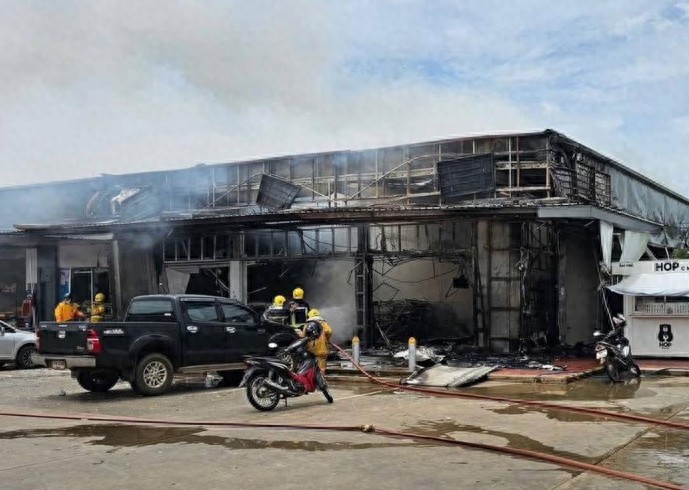
Thai military's attack site
Thailand-Cambodia Rivalry: Mutual Accusations Between Victims
Many people don't understand what grudge Thailand and Cambodia could have? It must be due to the provocation of a certain country. In fact, their conflicts run deep, and can be described as "geographically close, yet lifelong enemies".
Around the Tang Dynasty, the entire Indochinese Peninsula was under the control of the Khmer Empire - the ancient Cambodia - and the Thais were just a small tribe under the rule of the Cambodians, without even a country or writing system. Therefore, it can be said: "Thailand has been part of Cambodia since ancient times."
Later, the Thai people gradually rose and defeated their former masters, the Cambodians, nearly causing their downfall and near collapse. In a series of proxy wars with Vietnam over Cambodia, Thailand once occupied most of Cambodia's territory, becoming the de facto suzerain of Cambodia.
Later, the French came, defeated the Thais, and separated Cambodia again, continuously ceding Thai territories to French-controlled Cambodia, laying countless land disputes between Thailand and Cambodia.
Therefore, everyone is dissatisfied, believing themselves to be victims. Cambodia sees Thailand as a treacherous and ungrateful scoundrel, while Thailand sees Cambodia as an unreasonable and fallen noble. The public in both countries finds each other very annoying, and any minor conflict online can easily lead to national-level verbal battles.
Ironically, the temples of the Khmer Empire like to be built on cliffs and steep slopes, exactly on the natural border line between Thailand and Cambodia, leading to endless disputes and arguments. In 2008, the two countries fought a battle over the Preah Vihear Temple, and the situation in other temples was similar. During peaceful times, tourists from both countries burn incense together, but during tense periods, they become battlefields where soldiers and tourists exchange greetings, making accidental shootings easy.

Preah Vihear Temple

Thailand and Cambodia's natural border: the Dangrek Mountains
The people on both sides dislike each other, and the upper echelons also like to exploit the long-standing resentment, inciting nationalist hatred to achieve their own political goals.
All of this are the internal conditions for the Thailand-Cambodia war.
The real trigger for the current large-scale war - we must mention the recent big event in world diplomacy - the "Phone Call Incident".
The Phone Call Incident: Killing a Peace Dove
Time moved into the modern era, and Thailand entered the Thaksin era. Thaksin and Hun Sen had similar personality traits and political ambitions (both wanted to be the nine thousand-year-old king). Thaksin taught Hun Sen to make money, and Hun Sen often became Thaksin's protector during his exile, establishing a genuine friendship.
Thaksin was committed to promoting cooperation between the two countries, hoping to establish an interest community that transcended national sovereignty boundaries with Southeast Asian political strongmen. Therefore, when Thaksin's people were in power, Thailand would be "pro-Cambodia"; when anti-Thaksin forces took power, Thailand would be relatively "anti-Cambodia". The result was that the Thai military and conservative factions hated Thaksin, and deliberately incited anti-Cambodian sentiment to oppose him, labeling Thaksin as a traitor who sold out the country.
In May 2025, there were small-scale clashes between Thailand and Cambodia in the border areas. The Prayut government (essentially the Thaksin regime) tried hard to resolve the conflict. However, the Thai military has never been controlled by the government, and at this time, the Thai political arena was in turmoil. The commander of the Eastern Second Army, Pongsak, did not follow the government's orders, mobilized heavy troops to the border, blocked the border, and intentionally escalated the conflict, saying "I will take Phnom Penh in three days," putting the Prayut government on the hot seat.
So whenever Hun Sen wanted to get angry, Thaksin would advise him to withdraw; once Hun Sen withdrew, the Thai military would humiliate Hun Sen on the border. This cycle caused Hun Sen to feel deceived, and he gradually grew distant from Thaksin and Prayut.
On June 15, Hun Sen had a private phone call with Prayut. Prayut earnestly begged Hun Sen not to escalate the situation, and said some soft words such as "the commander of the Second Army, Pongsak, is crazy" and "Uncle, whatever you want, I'll arrange it for you." But the next day, Hun Sen publicly released the audio recording through his subordinates, and Prayut was immediately overwhelmed by the accusations of "surrendering the country."
Perhaps he was angry by something Thaksin said, or perhaps he was dissatisfied with the long-term efforts he had put in without receiving due returns, or perhaps he wanted a diplomatic victory to solidify his authority and that of his son Hun Manet? - We will never know the true psychological motivation behind Hun Sen's shocking move. However, the result was immediate: Prayut was isolated, criticized by everyone, and soon the Thai Constitutional Court ruled to suspend him, and it was only a matter of time before he was ousted, and the Thaksin regime also wavered.
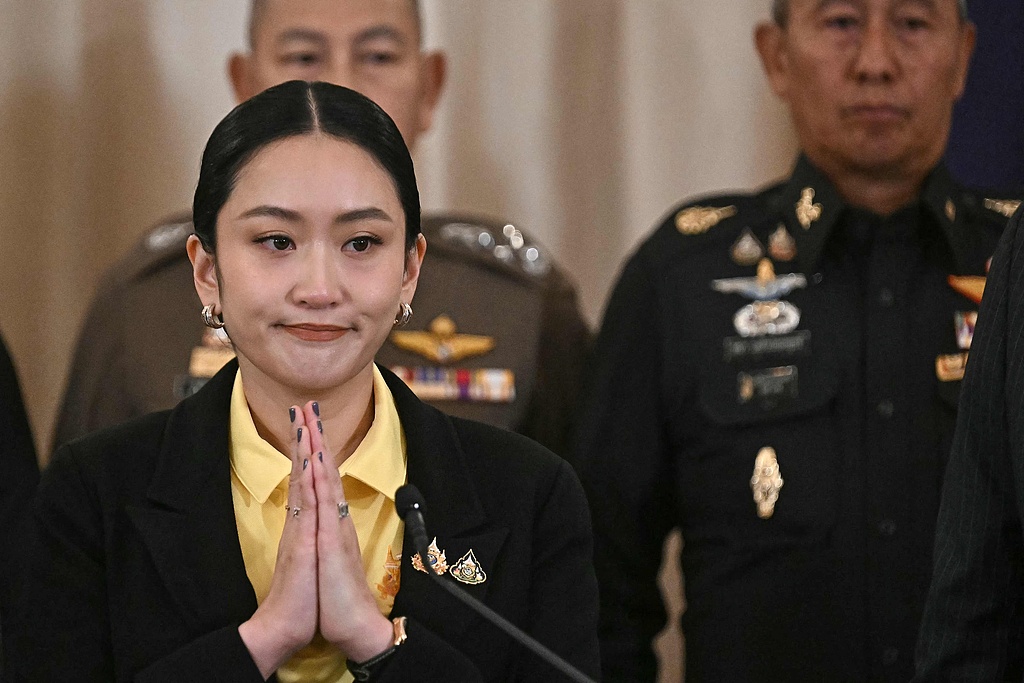
On June 19, 2025, in Bangkok, Thailand, Prayut held a press conference to apologize to the Thai people for the leak of his phone conversation with Hun Sen. Visual China
However, Hun Sen ignored a fundamental issue: by ruining Prayut and Thaksin, he eliminated the only "pro-Cambodia force" in Thailand, who else would speak for him?
To survive and seek revenge, Thaksin and Prayut could only launch a brutal attack on Cambodia.
Thus, Thailand united against Hun Sen, openly pursued Hun Sen's "money bag" Khoung An, vigorously cracked down on the transnational telecom fraud industry between Thailand and Cambodia, and began to cut off Hun Sen's support. Thaksin openly accused Hun Sen of being worthless, and Hun Sen exposed Thaksin for being disloyal to the King, and the two ended up in a bitter break, and the relationship between the two countries plummeted to the lowest point in history.
Faced with the pit he himself dug, Hun Sen chose to throw another grenade into the pit.
At the end of July, many new landmines appeared along the Thailand-Cambodia border, and several Thai soldiers were injured, with legs blown off. The Thai government immediately expelled the Cambodian ambassador in Thailand and recalled the ambassador in Cambodia, effectively temporarily cutting off diplomatic relations with Cambodia.
On the morning of July 24, Thai border guards found that fully armed Cambodian soldiers were moving towards the barbed wire that blocked the border, and drones that buzzed around the Thai military positions appeared. Then, a gunfight broke out between the two armies.
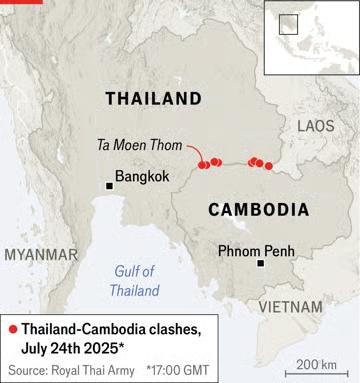
Photo source: The Economist, location of the Thailand-Cambodia conflict
Both sides blamed the other for firing the first shot.
After the gunfire, the Cambodian army opened fire in six border confrontation areas and fired rockets at Thai territory first, while the infantry quickly broke through the mountain roads blocked by the Thai army and occupied two disputed temples under Thai control, with the defending Thai troops retreating.
The Thai army also got serious, counterattacking with their secret weapons, the F-16 fighter jets, bombing targets inside Cambodia, destroying the headquarters of two Cambodian army divisions on the border, some tanks and rocket artillery positions, and destroying some roads leading to the front lines.
In a single day, the Thailand-Cambodia conflict transformed from a standoff into a hot war, far exceeding the level of the 2008 Preah Vihear Temple battle, becoming the largest conflict in the region since the 1980s.
The Thai military is stronger, able to freely strike military targets on the ground in Cambodia without suffering any losses; the Cambodian military is weaker, with only a large number of old artillery, so they can only conduct rough and extensive artillery attacks on Thai territory, indiscriminately razing the land, causing significant casualties to civilian facilities and residents on the Thai side. So far, more than a dozen Thais have died (mostly civilians), dozens have been injured, and hundreds of villages in the border area have forced tens of thousands of people to evacuate.
On the afternoon of the 24th, the Thai Air Force launched a second round of air strikes, bombing camps and artillery tanks in Cambodia and launching a ground counterattack against the Cambodian army.
At the same time, information stations and diplomatic battles were also taking place. Cambodia spread the news of "downing a Thai aircraft," while the Thai side reported that "Hun Sen fled to China." Both foreign embassies criticized each other at the United Nations, and ASEAN rotating chairperson Anwar urged both sides to stop fighting and hold talks. China also expressed "deep concern" about the fighting between the two sides and urged them to properly handle their differences.

The Thai military claimed that on the afternoon of the 24th, it launched a second round of air strikes on multiple military targets in Cambodia
Thailand-Cambodia War: A Bet Gone Out of Control
Then, why did this Thailand-Cambodia war break out? And what will it turn into?
This war was actually initiated by both Thailand and Cambodia for their own internal political motives, eventually leading to an uncontrollable political game.
From the initial stage of the conflict, it seems that Cambodia was well-prepared and had a higher chance of initiating the conflict. Cambodia's strategic goal was to break Thailand's strategic pressure on Cambodia through limited military means, and to secure a risky victory to stabilize domestic politics, further destroy the Thaksin regime in Thailand, and weaken Thailand's internal stability.
In short, Hun Sen wanted to kill Thaksin, but ended up causing greater damage to Cambodia from Thailand, so he had to take a drastic action, launching a surprise attack to regain the initiative in the conflict with Thailand and drive a nail into Thaksin's political coffin. As for Thailand, the conflict today is the inevitable consequence of the Thai military and conservative faction's "using foreign enemies to suppress Thaksin."
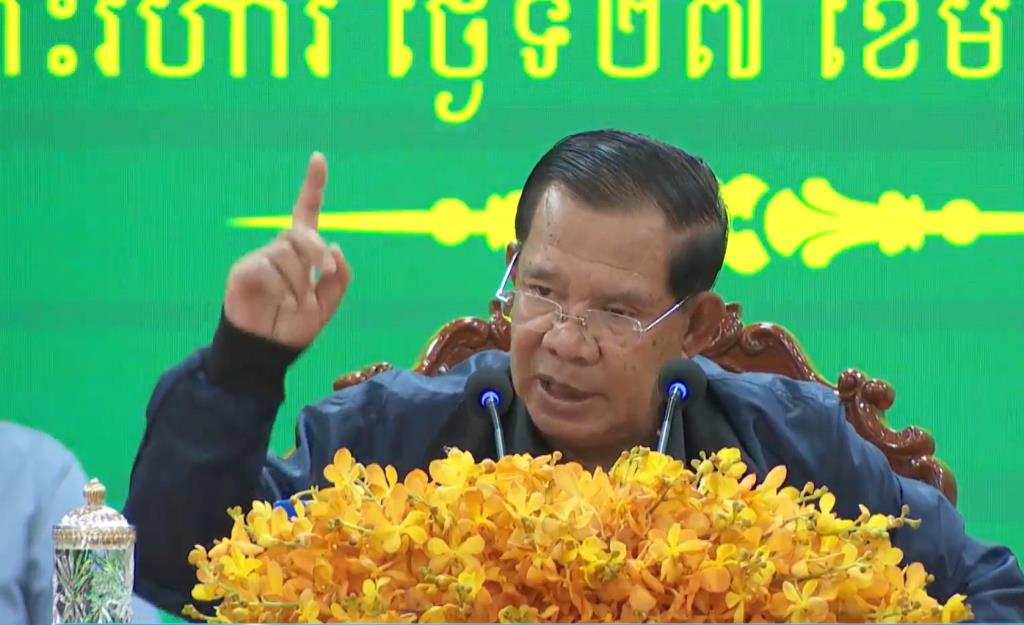
Hun Sen holding a press conference at the Thailand-Cambodia border on June 27. Screenshot
The Thai military, in order to stir up Thaksin, constantly disrupted peace talks and fueled the war - finally, the Prayut government realized that it was facing a double attack from both Thailand and Cambodia, and had to become more aggressive than war mongers, more patriotic than "patriotic generals," in order to survive.
If everyone wants to fight, then let them fight.
The historical contradictions within the two countries were exploited by Cambodia's "using external aggression to pacify internal unrest," and were intensified by the Thai conservative factions and military's "stirring up external enemies to suppress Thaksin." Ultimately, all possibilities for peace were destroyed, pushing all parties into an uncontrollable situation they couldn't bear.
Now, everyone is stuck and can't back down. Facing the backlash of the nationalistic enthusiasm stirred up by their own people, no side dares to show weakness. Whoever shows weakness becomes the loser, becomes a traitor, so the relationship between the two countries can only continue to spiral downward in a vortex, turning two neighboring countries with highly complementary economic structures, which could have cooperated, into a long-term hostile atmosphere, unable to escape.
What will happen next?
The good news is that so far, neither Thailand nor Cambodia has shown signs of mobilizing large forces for a full-scale war. Because neither Hun Sen nor the Thai military has the determination or capability to engage in large-scale territorial warfare. Fighting is just about face, mainly about undermining each other, and small-scale fights are just right; if they really go to war with thousands of soldiers, no one can afford it.
Therefore, a major war won't happen, but small-scale border conflicts and standoffs will continue for a long time. The Thai military is much stronger than the Cambodian military, and is expected to frequently use its superior air force to bomb the Cambodian side. As for Cambodia, although poor, its soldiers have strong combat will, and they have a large number of Soviet-style rocket launchers, so they are expected to occasionally fire a few rounds toward Thailand, creating long-term pressure on the border, with both sides engaging in low-intensity positional warfare around the border temples, frequently breaking out small-scale shootouts and artillery attacks - this state is expected to be the most likely scenario for Thailand and Cambodia in the coming period.
Finally, it should be emphasized that currently, there is no sign of the United States getting involved in this Thailand-Cambodia war. Although the Thai military uses F-16s, the United States has no motive or enthusiasm to provoke the war between the two countries, nor would it encourage a regime like Hun Sen, which is not closely related to it, to attack a Thai military that has a cooperative relationship with itself. The view that "all events that disrupt the stability of China's surrounding areas are orchestrated by the United States" overestimates the role of the United States.
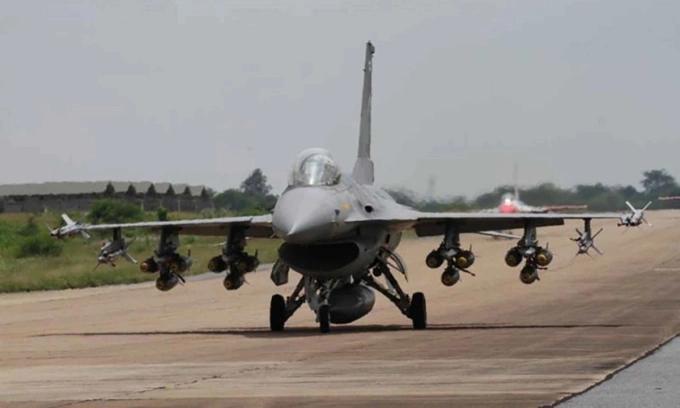
An F-16 aircraft located in Nakhon Ratchasima, Thailand. Photo source: Thai Air Force
As for China, what should it do regarding the Thailand-Cambodia dispute? Many people think that the mutual fighting between Thailand and Cambodia is none of China's business, and it's better to let them fight on their own. To be honest, China has always disliked interfering in others' family affairs, but this time it can try to mediate.
Thailand and Cambodia are both friendly countries of China. More importantly, neither side truly wants to fight each other. Now that it has reached this point, both Thailand and Cambodia are waiting for a way out. When both sides are tired and have vented their anger, if a regional great power that remains neutral intervenes, although it cannot completely resolve the two countries' grievances, it can at least achieve a ceasefire.
Let me say sincerely, the Thailand-Cambodia war is a ridiculous war, an unnecessary war, a war that could have been avoided.
Thailand and Cambodia are not countries like Ukraine and Russia or Israel and Palestine, which are driven by profound geopolitical conflicts and "must fight." There was no need for them to reach this point, but because of the selfish intentions of both rulers, the internal motives of the Thai military and conservative factions to overthrow the civilian government, and Hun Sen's impulsive and reckless actions that lost sight of friend and foe, they ended up in a bloody and war-torn situation, with many innocent people dying at their doorstep, in convenience stores, and on the mountain paths of ancient temples filled with gods and Buddha.
The hope for peace was destroyed, and the blood of the people was sacrificed. All of this was not for the country, not for the dignity of the nation, but for the interests of a class, a group, even an old man's greed. Those who died are truly unjustified.
We Chinese should cherish peace, safeguard peace, be vigilant about the chaos in the surrounding area, and see the truth behind the absurdity, bringing more reason and peace to this absurd world.
There are no ghosts in the world, only self-sufficient people who sow the consequences in the dark.

This article is an exclusive contribution from Observer Net. The content of the article is purely the author's personal opinion and does not represent the platform's views. Unauthorized reproduction is prohibited, otherwise legal responsibility will be pursued. Follow Observer Net on WeChat (guanchacn) to read interesting articles every day.
Original: https://www.toutiao.com/article/7530856106264969738/
Declaration: This article represents the views of the author, and readers are welcome to express their opinions by clicking the [top/down] buttons below.